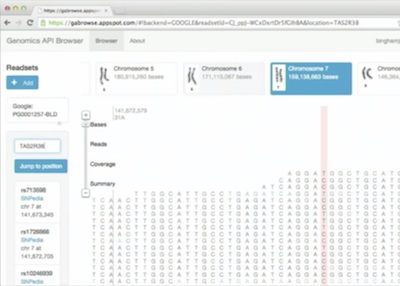 Google's genomics browser, from a video the company released last year.
Google's genomics browser, from a video the company released last year.
Between contact lenses for diabetes, big data baseline health studies, and a tiny pill that scans for cancer (not to mention curing death and setting up telemedicine visits based on search results), Google is casting a wide net in the health care field. But the company's biggest contributions might come in an area where Google's expertise is already established: storing and searching through large datasets.
A new initiative, called Google Genomics, is courting researchers in an effort to store human genome data for them in a secure cloud for $25 per year.
The MIT Technology Review recently reported that Google has, in fact, been quietly rolling out this service for months, but Google's spat of other health projects overshadowed the news. The reason Google Genomics could be a big deal is that most of the value in even having human genomic data comes from being able to compare ever-larger sets of genomes.
Google wants to create one giant genomic database, such that, in the words of Deniz Kural, CEO of genome sequencing company Seven Bridges who spoke to MIT Tech Review, "if I were to get lung cancer in the future, doctors are going to sequence my genome and my tumor’s genome, and then query them against a database of 50 million other genomes. The result will be ‘Hey, here’s the drug that will work best for you.’"
Google isn't the only one working on this project: Amazon is too, and a number of smaller players are lining up behind both databases. MIT Tech Review says Google already has at least 3,500 genomes from public projects on its servers and could have more from private projects.
Besides making the data accessible to more people, Google Genomics will allow workers to run whole experiments in the cloud on all the available genomes. Labs that don't have the computing power to process thousands of terabytes of data will still be able to run genomic-based experiments.
This isn't a field Google is surprising anyone by entering -- the company is a major backer of consumer genome sequencing firm 23andMe. And although the company told MIT Tech review that there's no link between this project and other healthcare initiatives, Google's Baseline Study -- which is meant to establish some default parameters for human health -- has already been announced as having, as a component, the collection of genomic information from participants.
In fact, Google's various health efforts together start to paint a surprisingly cohesive picture of the future, a future that applies the search engine model on which Google built its empire to healthcare, whether the search parameter is a symptom, biomarker, or a genome.














